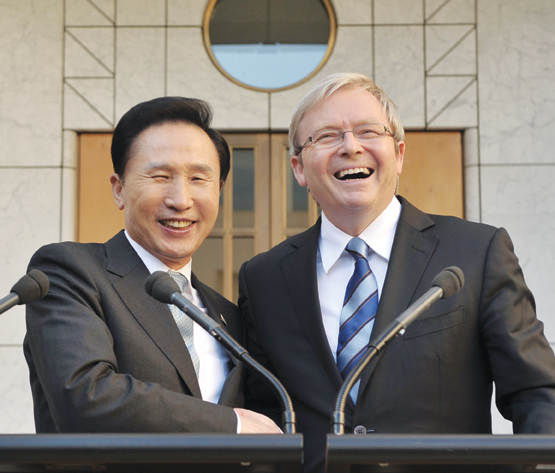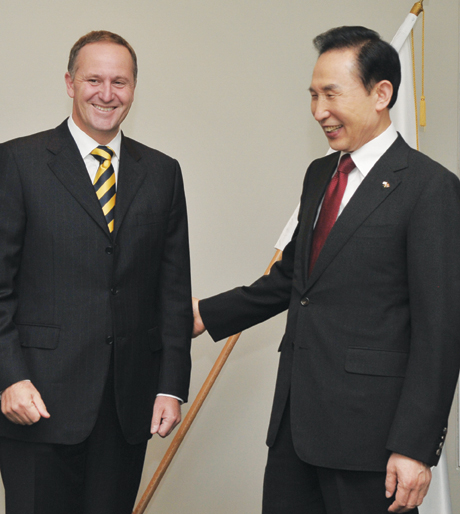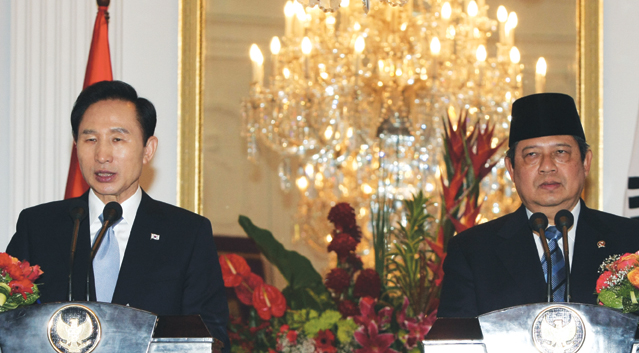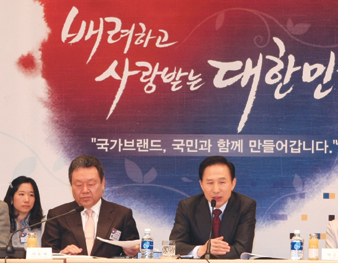President Lee Elated at Diplomatic Performance
Tangible results at G20 meeting, entry Into FSF


 President Lee Myung-bak's presidential office of Cheong Wa Dae appears to have rediscovered its self-confidence these days, encouraged by the recovery of Lee's approval rating to the mid-30 percent level. Among others, Lee and his staffers look elated at the results of Lee's recent overseas trips as part of summit diplomacy. And they appear satisfied with the results of a series of international meetings like the G-20 finance ministers' conference, which was also comprised of the heads of central banks of the respective nations.
President Lee Myung-bak's presidential office of Cheong Wa Dae appears to have rediscovered its self-confidence these days, encouraged by the recovery of Lee's approval rating to the mid-30 percent level. Among others, Lee and his staffers look elated at the results of Lee's recent overseas trips as part of summit diplomacy. And they appear satisfied with the results of a series of international meetings like the G-20 finance ministers' conference, which was also comprised of the heads of central banks of the respective nations.
Lee had been struggling in the aftermath of the so-called U.S. beef import controversy as a step toward the much-touted establishment of a free trade agreement with the United States in the initial stage of the Lee administration last year. Lee had focused on reviving the sagging national economy as the first priority of his administration. In this vein, he arrived with a package of initiatives on the international stage including one against possible protectionism. Cheong Wa Dae believes the agreement in that regard through the finance ministers' conference was largely based on the proposal by Lee that the world should fully cooperate and join hands to expand expenditures while rejecting protectionism as part of efforts to help reinvigorate the global economy at as early a date as possible.
Lee first expressed worries over the increasing trend toward protectionism during the financial summit in November in Washington, while proposing a 'stand-still' declaration that features a freeze on setting up barriers regarding trade and investment. With regard to the expansion of state expenses, Lee also proposed a 'global deal' to prevent the real economy from contracting, which could lead to massive unemployment, during the 'Global Korea 2000 Conference,' which was held in Seoul on Feb. 23. The government is set to officially propose the issue during a meeting of the G-20 to be held in London in April.
Regarding the Financial Stabilization Forum (SFS), Cheong Wa Dae has also underlined the role of President Lee. Presidential aides have said that Lee had been calling on existing FSF member nations like the United States, Japan, Australia and Singapore to extend a helping hand for the nation to join the club during the G-20 financial summit and his tour to Latin America for an APEC session. Cheong Wa Dae officials say that with the nation having entered the group, it will now be able to play a certain role in the process of coping with the current global economic crisis.
Lee is also elated at the recent progress in moves to set up a free trade accord between Korea and the European Union.
South Korea and the EU have virtually wrapped up their negotiations to forge a free trade agreement and are set to formally announce the deal early next month, Yonhap News Agency reported Monday, quoting officials. South Korea, Asia's fourth-largest economy, and the EU, the world's single-largest economic bloc, started the talks in May 2007, but differences over industrial tariffs and other sensitive issues have limited progress. The two sides will hold an eighth round of negotiations on March 23-24 in Seoul in what will be their final round of talks and will officially announce the deal at a summit of G-20 nations on April 2 in London, South Korean officials said. "With both sides publicly declaring the deal at the G-20 summit in London, they will show that protectionist measures can't resolve the current economic crisis," an official at the South Korean government was quoted as saying. According to multiple officials, South Korea and the EU agreed to eliminate or phase out tariffs on 96 percent of EU goods and 99 percent of South Korean goods within three years. As for auto trade, one of the most sensitive issues, the two sides agreed to eliminate tariffs on cars with an engine displacement of over 2.5 liters within three years. For cars with an engine displacement of less than 2.5 liters, they agreed to abolish tariffs within five years, officials said.
Currently, South Korea imposes an 8 percent import duty on European cars, while the EU imposes a 10 percent duty on South Korean cars. Separately, the Dong-a Ilbo reported earlier in the day, citing South Korean government officials, that Brussels suggested to Seoul that they officially announce their free trade deal at a meeting of G-20 countries in London early next month.
The South Korean government was "positively" reviewing the EU offer, the newspaper reported. The EU was South Korea's second largest trading partner after China last year, with two-way trade reaching about $80 billion. South Korea reached a free trade deal with the United States in 2007, shortly before it launched the talks with the EU. nw
(clockwise) President Lee Myung-bak, on an overseas visit, holds a joint press conference with Australian Prime Minister Kevin Rudd on March 5 following their meeting.; President Lee meets with New Zealand Prime Minister John Key on March 3.; and President Lee and his Indonesian counterpart President Yudhoyono hold a joint press conference on March 7.
President Lee presides over the first reporting session of the Presidential Commission on National Brand on March 17, as Euh Yoon-dae, chairman of the commission, looks on.
3Fl, 292-47, Shindang 6-dong, Chung-gu, Seoul, Korea 100-456
Tel : 82-2-2235-6114 / Fax : 82-2-2235-0799